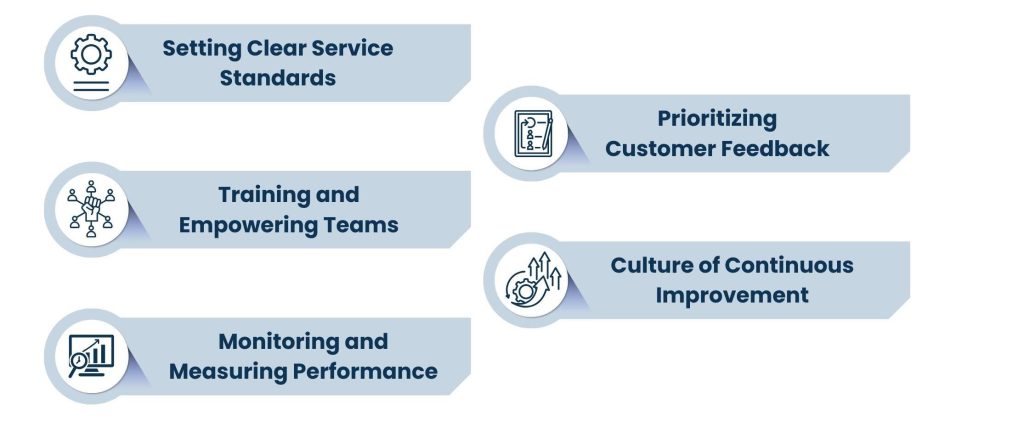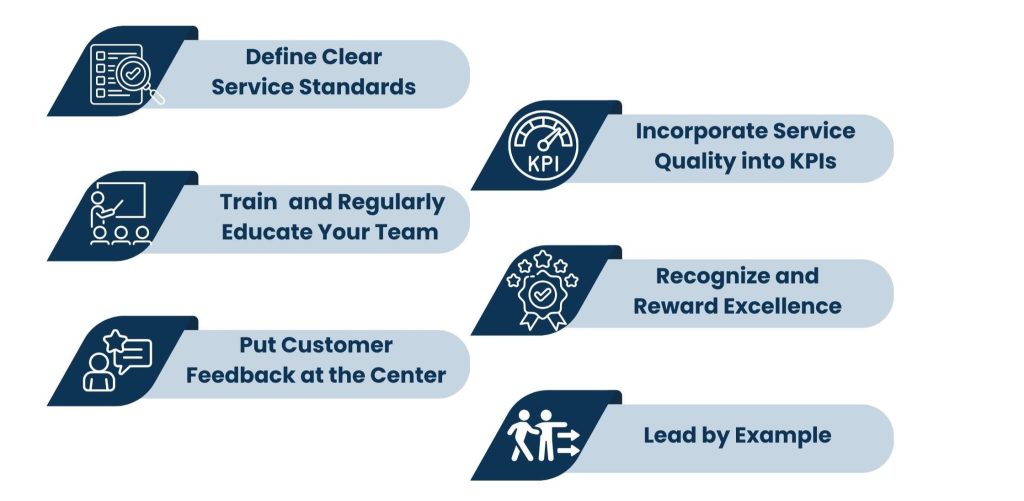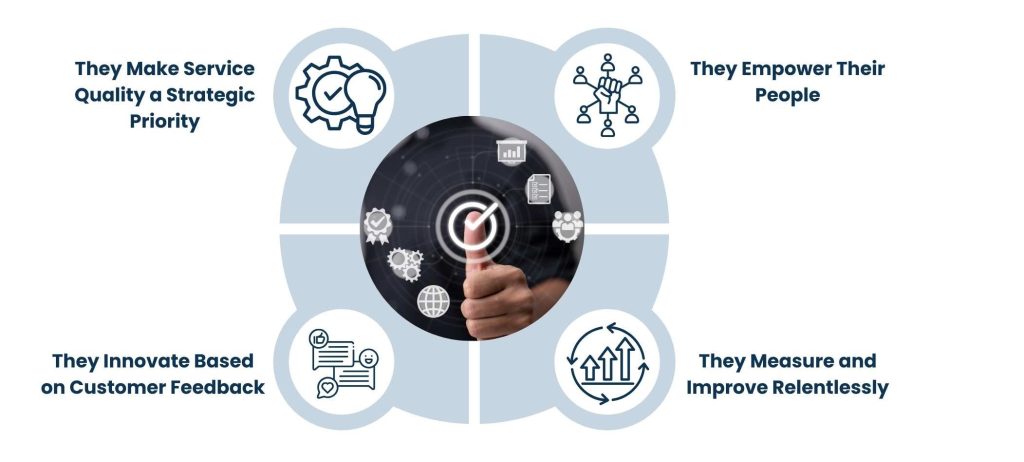Introduction
Customer service isn’t something that companies can do lightly, it’s a competitive advantage. Businesses that deliver consistently high-quality service win more than just customers — they cultivate loyal advocates who, in turn, drive sustained success. Service Quality Management is the surprise in every customer interaction.
It’s not just about problems solved or “good enough;” it’s embedding a passion for excellence at the foundational level of your company.
A real culture of excellence does not materialize out of thin air. It takes committed leadership combined with continuous training and improvement, and a relentless focus on service standards inside and outside the organization. When quality-of-service becomes a core value, companies will enjoy greater customer loyalty, deeper employee engagement, and real growth.”
In this blog, we’ll cover:
- What does service quality management mean today.
- How it shapes a true culture of excellence.
- Key steps to embed service quality into your business operations.
- How leading companies use service quality to stay ahead.
If you want your business to excel at what you do and how you do it, this is the first step in mastering Service Quality Management.
What Is Service Quality Management and Why Does It Matter?
Service Quality Management is the disciplined system of designing, implementing, measuring, and improving customer experiences that exceed or meet customer expectations. This isn’t just about fixing breakdowns when they happen — it’s also about actively constructing, now, the systems, habits, and attitudes that produce excellence all the time.
Service levels just keep getting higher in today’s customer-centric economy. Users want quick, personalised, and painless solutions. But unless they are proactively keeping the service quality up to scratch, they will be losing out to competitors.

Here’s what Service Quality Management today looks like:
1. Setting Clear Service Standards
Companies require clear and measurable service standards, not vague promises such as “we offer great service.” Service standards must include response times, issue-resolution processes, communications tone, and quality checkpoints. When expectations are clear and visible, employees know precisely what to do in every customer encounter. This clarity reduces confusion, enhances consistency, and empowers management to hold everyone accountable to the same high standard.
2. Training and Empowering Teams
So let your employees be the face of your quality of service. To maintain superior service at each touchpoint with the customer it requires comprehensive training programs, ongoing coaching, and empowerment to make customer-focused decisions. Training needs to be experiential, not academic — real-world examples, role playing, and constant skill refresher courses make a world of difference. More productive: When employees are empowered, they’re empowered to respond to and solve problems faster, which leads to faster service and less customer dissatisfaction, as well as confidence among the workforce.
3. Monitoring and Measuring Performance
It’s not sufficient to believe service quality is high, companies need to monitor metrics such as customer satisfaction ratings (CSAT), Net Promoter Score (NPS), response times, and recovery rates periodically. This establishes a continuous improvement feedback loop. Periodic performance analysis based on hard facts ensures weak areas are addressed before becoming major issues. They also establish points of excellence that can be scaled across teams, making the customer experience more uniform.
4. Prioritizing Customer Feedback
Customer feedback is not only valuable — it’s a goldmine. Proactive gathering and interpreting reviews, surveys, and explicit feedback allow businesses to identify areas of service lapses and tap into opportunities for enhancing loyalty. Soliciting honest, open feedback — even when it’s negative — demonstrates to customers that their thoughts count and promotes stronger trust. Visible action based on feedback further improves your reputation as a listen, learn, and adapt business.
5. Culture of Continuous Improvement
Service quality is an evolving notion. Best-in-class organizations create cultures of constant change, prompting teams to constantly look for better ways to serve, innovate, and outperform. “Continuous improvement is about embracing small wins and looking at mistakes for what they are, opportunities to learn, and not failures. These companies will be more flexible, more responsive, and ultimately more adaptable to changing customer expectations as the long game unfolds.
Also Read: Virtual Assistant Services in Grouville
How SQM Drives a Culture of Excellence
The point here is that a culture of excellence is not created with a few motivational posters on the wall and the occasional act of excellent service; it is developed through committed behavior, habits, and a shared mindset across the entire organization. Service Quality Management is the process that makes one-off service standards an everyday reality.
This is how best practices in great service quality build and sustain a culture of excellence:
1. It Aligns Everyone Around a Common Purpose

When service quality is paramount, all departments are customer-facing staff and know their part in providing an exceptional experience. From product development through billing, each function views itself as playing a role in customer satisfaction. This common focus erases internal silos that can lead to inconsistent service.
Everyone, from marketing through operations, has a clear mission: surprise and delight customers at every touchpoint.
2. It Raises the Bar for Accountability

Well-defined service standards ensure that every person on the team knows what is expected and how to judge success. By providing frequent checks and feedback, excellence is no longer an abstract end, but a shared goal. When individuals and teams know they are accountable for measurable service goals, the culture is one of accountability, where corners aren’t cut. Accountability breeds a pride in getting it right the first time and taking responsibility when it’s not.
3. It Empowers Employees to Own Customer Outcomes

Service quality management is not about rules, but instead about enabling people. Trained, trusted, and enabled employees are more likely to take initiative, solve problems creatively, and provide experiences that surprise and delight you as a customer. Staff who are authorised to think don’t have to pass every small glitch up the line, or ask for permission to act; they make decisions on the spot, and this speeds service delivery while, at the same time, boosting brand value in the eyes of the customer.
4. It Makes Change a Habit

In service quality-oriented organizations, change is not dreaded; it is welcomed. Teams anticipate optimizing processes, communication, and evolving according to the needs of the customers. It’s a culture of evolution that motivates staff to suggest fresh ideas and adapt best practices instantly. Companies that make learning the norm build a solid foundation for long-term innovation and competitiveness.
Also Read: Virtual Assistant Services in Saint Brelade
5. It Turns Excellence Into a Habit, Not an Exception

When service quality becomes part of everyday habits, doing things “the right way” is second nature. Excellence is no longer a special initiative or annual effort — it’s the default. As time passes, this creates repeated customer experiences that build trust and loyalty. Organizations that master this degree of embedded excellence make their brand a familiar name that customers keep coming back to.
Excellence is a dream without Service Quality Management. With it, excellence becomes a style of working, day by day, customer by customer.
Key Steps to Embed Service Quality Management into Your Business Operations
Service Quality Management doesn’t happen overnight; You have to create a culture of excellence. It requires work, leadership, and clear processes. The good news? Done well, the payoff ripples throughout your entire organization, in the form of customer loyalty, employee satisfaction, and business health.

Here are some ways to ensure service quality is a part of your business operations:
1. Define Clear Service Standards
Begin by delineating precisely what great service is for your company. Establish communication style, response time, issue resolution, professionalism, and tone expectations. These expectations should be specific, measurable, and appropriate for your line of business. Clear guidelines provide employees with a map to success and eliminate ambiguity from customer encounters.
2. Train and Regularly Educate Your Team
Service is not a one-time training; it is an ongoing training. Offer regular training workshops and role-plays, and coaching in communication skills, empathy, problem-solving, and flexibility. The more skilled and exceptional your staff are, the better they will perform under pressure.
3. Put Customer Feedback at the Center
Implement various avenues of collecting customer feedback — surveys, post-interaction reviews, social media listening, and direct follow-up. Feedback shouldn’t be a papered-over item; it should proactively fuel improvements. Publicly celebrate good feedback and respond constructively to negative feedback, demonstrating to your team and your customers that you mean business when it comes to listening and changing.
4. Incorporate Service Quality into KPIs
Service quality must be included in how you define success, not as a theoretical aspiration. Make customer satisfaction scores, Net Promoter Scores (NPS), resolution times, and service recovery rates part of employee reviews and team KPIs. When service excellence is directly linked to recognition, bonuses, and advancement, it’s a priority at all levels.
5. Recognize and Reward Excellence
Catch your workers doing the right thing and celebrate it. Put in place recognition programs that reward exceptional service moments, either through shout-outs at team meetings, spot bonuses, or “employee of the month” recognition. A culture that honors service excellence motivates all workers to up their game.
6. Lead by Example
Leadership has to demonstrate the conduct they wish for employees to demonstrate. Leaders who put customer satisfaction first, speak to employees with respect, and strive for relentless improvement establish the tone for the entire organization. Excellence trickles down from above, or does not occur in the least.
Combining Service Quality Management with your organization isn’t a matter of doing more work; it’s about making every interaction better, every employee more engaged, and every customer more loyal. Consistency, communication, and dedication make service excellence a way of life, not an ideal that is simply aspired to.
How Top Companies Use Service Quality Management to Remain Ahead

1. They Make Service Quality a Strategic Priority
In great companies, service excellence isn’t solely the responsibility of frontline employees. It’s debated at board meetings, it is central to the overall business plan, and viewed as a key to profitability and expansion.
Management realizes that operational effectiveness and creativity are valuable, but without world-class service, customer loyalty will collapse. Strategically prioritizing service keeps the entire organization focused on creating memorable customer experiences.
2. They Innovate Based on Customer Feedback
Leaders in service don’t merely gather feedback, they act upon it. They keep improving their processes, rolling out new services, and cutting friction points based on what they hear from customers. Top companies don’t shy away from complaints or criticism; they use them as a straight path to improvement. This cycle of feedback reinforces customer relationships and ensures that their offerings stay in sync with the market.
3. They Empower Their People
The best companies understand that scripted answers and ironclad rules don’t breed loyalty; empowered employees do. When employees feel empowered to creatively solve a problem, they take ownership of customer satisfaction. This results in faster solutions tailored to each customer, and a corporate culture that makes employees feel valued and in control of being excellent.
4. They Measure and Improve Relentlessly
Measurements such as Net Promoter Score (NPS), Customer Effort Score (CES), and customer satisfaction scores are included in everyday reporting, not quarterly assessments. By constantly checking data and trends, these firms identify issues early and reinforce what’s going right. Service excellence is a moving target, they’re always pursuing and hitting instead of presuming prior success will bring future loyalty.
In brief: The best companies make Service Quality Management a never-ending journey, not a destination. They know that in an era of unlimited options, great service isn’t a nicety — it’s the key to lasting leadership.
Conclusion
Developing a culture of excellence takes more than temporary pushes or major ad campaigns. It’s incorporating Service Quality Management into the fabric of your entire organization, from leadership to customer support groups to backend systems.
When service excellence is in your DNA every day, you not only meet the expectations of your customers, you exceed them day after day. This loyalty builds higher retention levels, more word-of-mouth referrals, greater brand reputation, and profitable, long-term growth.
How Tasks Expert Can Help
At Tasks Expert, we are dedicated to assisting organizations in enhancing the quality of services through strategic solutions support. You may require qualified virtual assistants, service process improvement, or managing customer feedback; we ensure you maximize your visibility, leads, and ROI.
Ready to stop getting lost in search results and start getting found? Let Tasks Expert craft a winning SEM strategy for your business in 2025.
About Us
Tasks Expert offers top-tier virtual assistant services from highly skilled professionals based in India. Our VAs handle a wide range of tasks, from part time personal assistant to specialized services like remote it support services, professional bookkeeping service etc. Furthermore, it helps businesses worldwide streamline operations and boost productivity.
Ready to elevate your business? Book a Call and let Tasks Expert take care of the rest.









